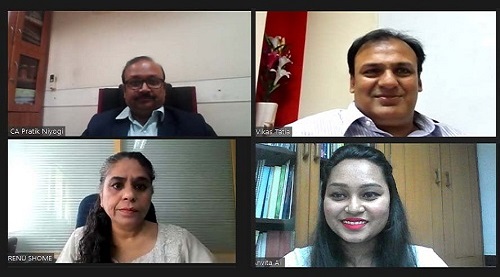The Council of EU Chambers of Commerce in India along with Dev Mantra Financial Services Pvt. Ltd organized a webinar on “Advance Tax: Important Validations Before Payment” on March 12, 2021 .

The speaker was CA Pratik Niyogi, Associate, Dev Mantra Financial Services Pvt. Ltd. The webinar covered what is Advance Tax, Liability to pay Advanced Tax, manner of computation and steps to compute, payment of Advance Tax, due dates for installments and so on.
Dr. Renu Shome, Director, EU Chambers welcomed the attendees she briefed the attendees with the activities of the chamber and also introduced CA Pratik Niyogi.
CA Pratik Niyogi mentioned that the Tax that is paid as income is earned. This scheme of advance payment of tax is also called as Pay as you earn income. Tax is paid in advance when Ta x Liability is more than 10,000. Advance Tax is paid in the previous year itself, thus the Tax is paid in the year of earning income itself.
He further explained the tax rates for Domestic companies. He mentioned eight steps to compute Tax under section 209.
He explained the due dates for installment of Advanced tax. If the due date is on or bfore 15th June the amount payable is not less than 15%, if its on or before 15th September then the amount payable is not less than 45% of Advance tax payable. If the due date is on or before 15th December then the amount payable is not less than 75% of Advance tax payable and if the due date is on or before 15th March then the amount payable is not less than 100% of Advance tax payable.
He further added that Interest on Non payment or short payment of Tax is applicable when someone fails to pay advance tax or the Advance tax paid is less than 90% of Assessed tax. The rate of interest charged is 1% for every month or part of a month. The interest charged is on assessed tax. It is applicable from 1st April of the A.Y. to the date of determination of income or where regular assessment is made to the date of regular assessment.
The interest on shortfall is not payable on the amount of capital gains; or Income of the nature referred to in sub-clause (ix) of clause (24) of section 2; or Income under the head profits and gains of business or profession & in cases where the income accrues or arises under the said head for the first time; or Income of the nature referred to in sub-section (1) of section 115BBDA and the assessee has paid the whole of the amount of tax payable.
He mentioned the tax reforms in the Atmanirbhar Bharat. He also explained few case studies. The webinar was concluded by Q&A.
